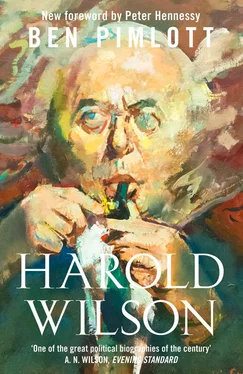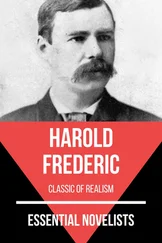When he was fourteen and out camping with the Milnsbridge Baptist Scouts, Harold caught typhoid from a glass of milk at a nearby farm. Of a dozen people who contracted the disease during the local outbreak, six died. For a month and a half Harold’s condition was critical. While he lay in Meltham Isolation Hospital, his parents were only permitted to visit him for half an hour, once a week. For fear of spreading the disease, Marjorie – now studying chemistry at Leeds University – was not allowed to see him at all. Herbert telephoned the hospital daily throughout October 1930. At the end of the month he was told his son was out of danger, but this information was immediately followed by news of a relapse. For weeks Herbert and Ethel dreaded the telephone, in case a call from the hospital might mean that their son was dying. At last the crisis ended, and in January 1931 Harold was allowed home. During his illness his weight fell to 4½ stone. Afterwards, the whole family felt overwhelming relief, and there was a heightened sense of Harold as a special child. Appropriately, there is a family story that underlines this point. ‘The lad is being saved for something,’ Harold’s grandfather is supposed to have said. 9
Harold was soon fully restored to health. Meanwhile, another disaster had occurred, from which there would be no easy recovery. In December 1930, while Harold sometimes seemed hours from death, Herbert had lost his job. In this, he was not alone. One worker in three in the Colne Valley was unemployed in 1930. Because of the strength of the textile industry and the growth of engineering, Huddersfield had been cushioned during the 1920s from the worst impact of the gathering depression. By the turn of the decade, however, the contraction of markets was affecting every industry, and the dyestuffs trade was badly hit. For Herbert, it was a devastating blow, as much to his self-esteem as to his pocket. For a dozen years after the ending of the war, he had hung on in a business which had undergone many changes, as Imperial Chemical Industries Ltd widened its rationalizing grip, absorbing and dismembering local firms. Despite his experience and dedication, he had been overtaken by better qualified, younger men. Herbert was forty-eight and a specialist: the chances of finding work of a suitable kind in the locality were low.
The Wilsons regarded Herbert’s unemployment as though it were a family disgrace, and hid it from the neighbours. ‘It was very much hushed up,’ Ainley remembers. 10Herbert and Ethel deliberately withheld the news from Harold until he was better. When they finally told him, he realized how serious it was. Marjorie already knew. It may have been a combination of anxiety about Herbert’s redundancy, and alarm about Harold’s illness, that caused her to fail her exams, ending her student career at Leeds University and destroying her father’s hope that she would follow in his footsteps as a chemist with the college degree he never had. Faced with mounting bills, the Wilsons considered panic measures, including the possibility that Harold might leave school at sixteen (he was fifteen in March 1931) and work for one of his uncles in Manchester. Instead, they tightened belts and lived on savings during two grim years in which Herbert wondered whether he would ever have proper work again. ‘Unemployment more than anything else’, Harold later claimed, ‘made me politically conscious.’ 11We need not doubt it.
During the first months of this secret domestic misery, Harold stayed at home, recovering from his illness. Though he studied privately, he fell behind in mathematics, and needed extra tuition when he returned to school after Easter. He soon caught up, and – his vigour revived – began to take an interest in the emerging political crisis in which the MP for Colne Valley was taking a prominent, and puzzling, part. The second Labour Government, formed in 1929 with Philip Snowden once again Chancellor of the Exchequer, had lasted longer than the first. In August 1931, however, the worsening economic climate precipitated its collapse. After the Cabinet failed to agree to Snowden’s demand that unemployment benefit should be cut, Ramsay MacDonald went to the Palace to tender his resignation and that of his administration. When he returned, ministers were informed that, instead of resigning, MacDonald had accepted the King’s commission to form a ‘National’ government, supported by the Conservatives and some Liberals. Snowden was one of the few Labour ministers to join him: most of the Labour Party opposed the new administration. In the general election that autumn Snowden denounced Labour’s programme as ‘bolshevism run mad’. Labour was reduced to fifty-two seats, and did not form another government until 1945.
Harold and his friends took a lively interest in these events, and in the treachery, as many saw it, of the Colne Valley Member. Snowden had a devoted following in the constituency, and his decision to turn on his former supporters caused consternation. Allegedly, Harold’s grandfather wept in angry disbelief. A year later, Harold went with a group of Roydsians to hear two Liberal MPs explain why the Liberals had withdrawn support from the National Government. One of the MPs was Dingle Foot, recently elected Liberal MP for Dundee, who was later to join the Labour Party and serve in Harold’s government. 12
In the autumn of 1932. Herbert at last found a job – but not in Milnsbridge or Huddersfield. He was offered the post of chief chemist at Brotherton’s Chemical Works, at Bromborough, in the Wirral peninsula in Cheshire, just across the Mersey from Liverpool. Herbert was nearly fifty. It was the opportunity he needed, and a cause of intense relief to the whole family – ending the long period of unspoken suffering. The change necessitated a move. The Wilsons had lived in the Colne Valley for twenty years, and felt part of the community. The dislocation was particularly great for Harold, who had known no other home but Western Road. The churches, scout troops, schools, football teams and local personalities of Milnsbridge and Huddersfield made up his world. Though he left the area when he was sixteen, in later life he always thought of himself as a Huddersfield man.
Yet in many ways it was a positive move, creating new opportunities for Harold, as well as for his father. As part of the deal, Herbert received a Brotherton’s company flat in Spital Road. This included the spacious ground floor of a large Victorian house, set in a tree-lined garden. Bromborough, though only five miles from the centre of Liverpool, was close to beautiful countryside in the mid-Wirral. Not far away, there were fine views of the Welsh mountains across the Dee Estuary. Most of the old buildings in Bromborough had been demolished before the First World War, but Spital Road stood at the edge of Brotherton Park, and close to an ancient water-mill, which had reputedly been in continuous use for five centuries. 13Most important, however, was the local school.
Faced with the problem of Harold’s interrupted education, Herbert’s brother Jack recommended the newly established Wirral Grammar School: it was helpful advice. Once again, Harold benefited from the expansion of secondary education which had followed the First World War. After the conventional Royds Hall regime, however, Wirral was an awakening. Although a single-sex school (Royds had been mixed) it was modern in its outlook. Set up even more recently than Royds Hall, it was still fired by a frontier spirit. All the staff were under thirty. ‘You seem to have a high regard for teachers,’ an interviewer put it to him, after he became Leader of the Opposition. ‘Coming from my kind of background’, he replied, ‘teachers were the most important adults in your life.’ 14Outside his own family, it was the teachers at Wirral Grammar School whom he had most in mind.
Читать дальше











